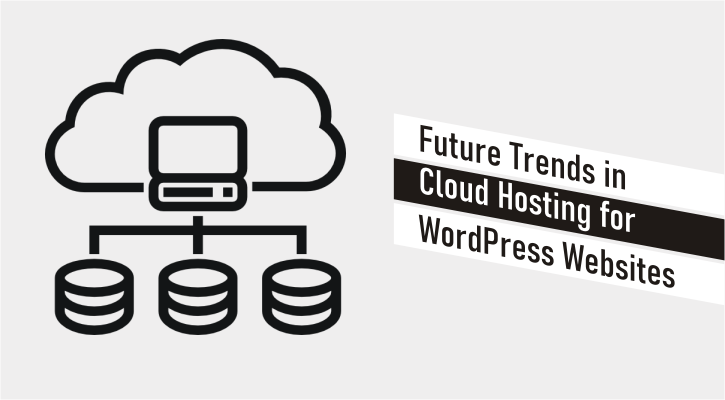Cloud hosting has revolutionized the way WordPress websites are hosted, offering flexibility, scalability, and reliability that traditional hosting models can’t match. As WordPress continues to be the most popular content management system (CMS) globally, powering over 40% of all websites, the integration of cloud hosting with WordPress is evolving rapidly. In this post, we’ll explore the future trends in cloud hosting for WordPress websites, including the latest advancements, security developments, and the impact of emerging technologies.
1. Serverless Architecture
One of the most anticipated trends in cloud hosting is the growth of serverless architecture. With serverless hosting, website owners no longer have to manage server infrastructure. Instead, cloud providers handle server management, allowing developers to focus purely on building and optimizing their websites.
Serverless architecture allows websites to scale automatically based on traffic demands. For WordPress users, this means that during periods of high traffic, such as Black Friday sales or viral content, their website’s hosting capacity can adjust without manual intervention. This results in cost savings since users only pay for the resources they use, rather than over-provisioning servers for peak times.
Companies like Amazon Web Services (AWS) and Microsoft Azure already offer serverless computing services, and WordPress users can expect more tailored serverless solutions specifically designed for WordPress optimization in the future.
2. Edge Computing for Enhanced Speed
As the internet becomes more decentralized, edge computing is emerging as a critical trend for cloud hosting. Edge computing involves processing data closer to the user rather than relying on a central server, significantly reducing latency and improving website performance.
For WordPress websites, integrating edge computing can lead to faster load times, especially for global audiences. Instead of hosting content in a centralized data center, cloud providers use Content Delivery Networks (CDNs) to deliver content from servers located near the user. This is a game-changer for businesses with geographically diverse audiences, ensuring that all visitors experience fast website performance.
Cloudflare and AWS already provide edge computing services, and more cloud hosting providers are likely to integrate edge computing solutions specifically for WordPress websites. As more businesses expand globally, the demand for faster, localized website performance will drive the growth of edge computing in WordPress hosting.
3. Increased Automation with AI and Machine Learning
Artificial intelligence (AI) and machine learning are set to transform cloud hosting by automating routine tasks and enhancing website performance. AI can predict traffic surges and automatically adjust hosting resources, preventing downtime and ensuring a smooth user experience. Additionally, machine learning can help with predictive website maintenance by identifying potential issues before they escalate, such as plugin conflicts, security vulnerabilities, or performance bottlenecks.
For WordPress websites, this means that website owners and administrators will spend less time managing technical aspects and more time focusing on content and strategy. Hosting providers may introduce smart dashboards that give real-time insights and recommendations powered by AI to improve website performance, security, and SEO.
As AI continues to evolve, WordPress cloud hosting will become more proactive, reducing the need for manual intervention and enabling websites to run more efficiently.
4. Enhanced Security with Zero Trust Architecture
Security has always been a primary concern for WordPress website owners, especially given the CMS’s popularity and the prevalence of plugins and themes that can introduce vulnerabilities. To address these concerns, cloud hosting providers are adopting a zero-trust security model, which assumes that every interaction with the website—whether internal or external—could be a potential threat.
Zero trust architecture relies on continuous verification and authentication of users, devices, and data, ensuring that only authorized entities can access the website. This model is particularly important for eCommerce WordPress websites that handle sensitive customer data, such as payment information.
Cloud hosting providers are expected to implement more advanced encryption techniques, automated security updates, and AI-powered threat detection. These security measures will make WordPress websites more resilient against cyberattacks, hacking attempts, and data breaches.
5. Kubernetes for WordPress Scalability
Kubernetes, an open-source container orchestration platform, is rapidly becoming a standard in cloud hosting due to its ability to automate the deployment, scaling, and management of containerized applications. Kubernetes enables WordPress websites to scale horizontally by creating multiple instances of the website across different servers.
This trend allows WordPress websites to handle significant traffic increases without experiencing slowdowns or crashes. It’s particularly beneficial for larger businesses or media websites that experience fluctuating traffic levels. Kubernetes also simplifies the management of WordPress environments, allowing developers to deploy, test, and update their websites without downtime.
As more cloud hosting providers offer managed Kubernetes services, WordPress users will have access to advanced scalability features that were once only available to enterprise-level businesses.
6. Green Cloud Hosting and Sustainability
With the growing focus on sustainability, green cloud hosting is becoming an important trend for businesses looking to reduce their environmental footprint. Traditional data centers consume significant amounts of energy, and cloud hosting providers are increasingly turning to renewable energy sources and energy-efficient practices to power their data centers.
WordPress users are also becoming more conscious of their website’s environmental impact, and green hosting will soon become a differentiating factor when choosing a cloud provider. Major cloud hosting providers like Google Cloud and AWS have already committed to sustainability goals, such as operating entirely on renewable energy in the near future.
In addition to energy-efficient hosting, WordPress users can expect more tools to monitor and reduce their website’s carbon footprint. Hosting providers may introduce features that optimize website performance, reduce unnecessary resource usage, and encourage the use of lightweight themes and plugins.
7. Multicloud Hosting Strategies
Multicloud hosting, where businesses use multiple cloud providers simultaneously, is becoming an attractive option for WordPress users. Instead of relying on a single cloud provider, multicloud strategies enable WordPress websites to distribute their hosting across several platforms, enhancing reliability, uptime, and performance.
For instance, a WordPress website might use AWS for compute resources, Google Cloud for storage, and Azure for backup and disaster recovery. This flexibility ensures that website owners aren’t locked into one provider and can select the best services based on their specific needs. Multicloud hosting also provides redundancy, so if one provider experiences an outage, the website can continue running on another platform.
As more businesses adopt multicloud strategies, hosting providers will likely offer seamless integration between different cloud platforms, making it easier for WordPress users to manage and optimize their hosting environments.
Conclusion
The future of cloud hosting for WordPress websites is incredibly promising, driven by technological advancements and growing user demands. From serverless architecture and edge computing to AI-powered automation and enhanced security, these trends will continue to shape how WordPress websites are hosted and managed.
As businesses strive to offer better user experiences, faster load times, and stronger security, cloud hosting providers will need to innovate continually. WordPress users should stay informed about these trends to leverage the latest technologies and ensure their websites remain competitive, secure, and efficient in the coming years.


